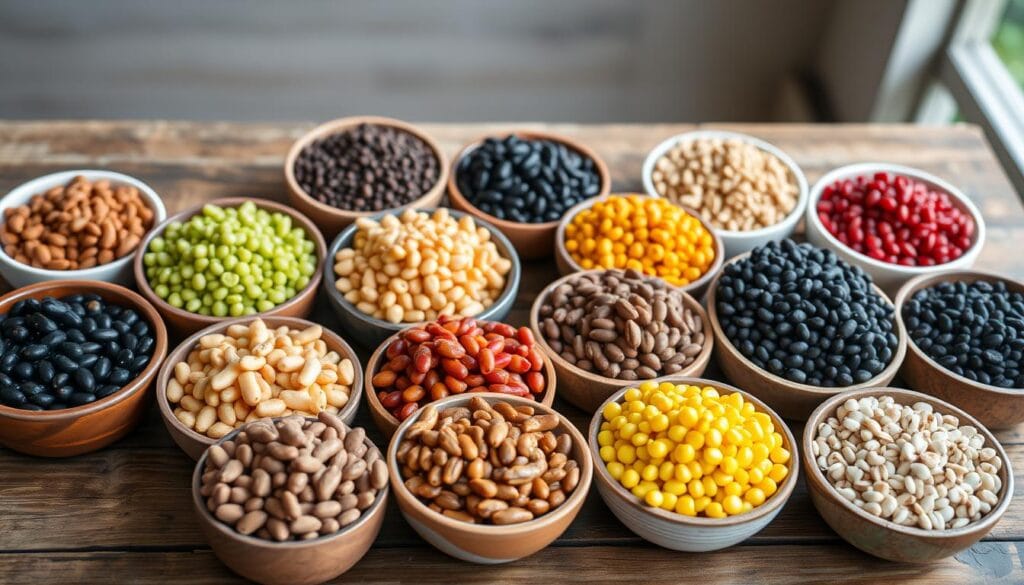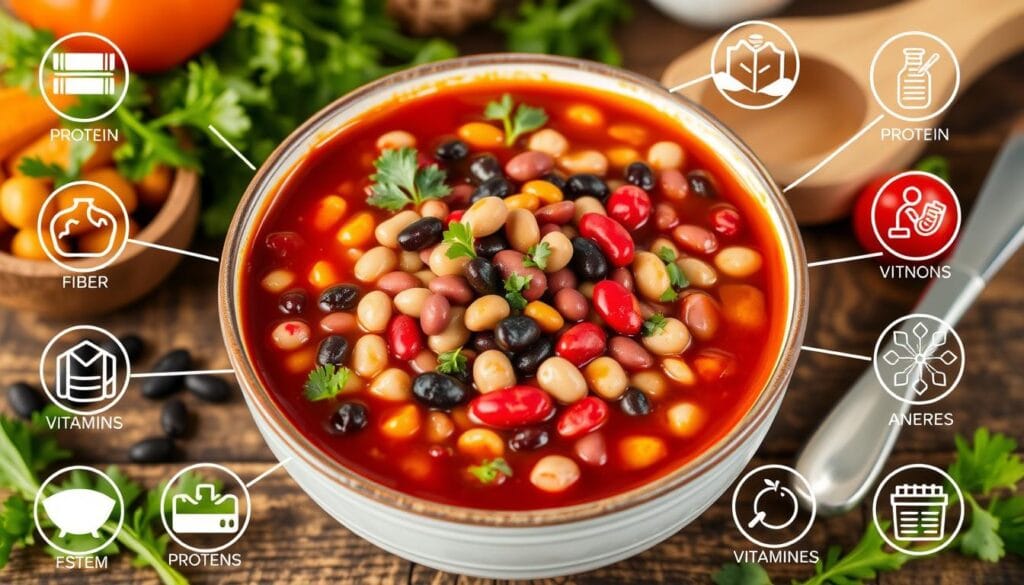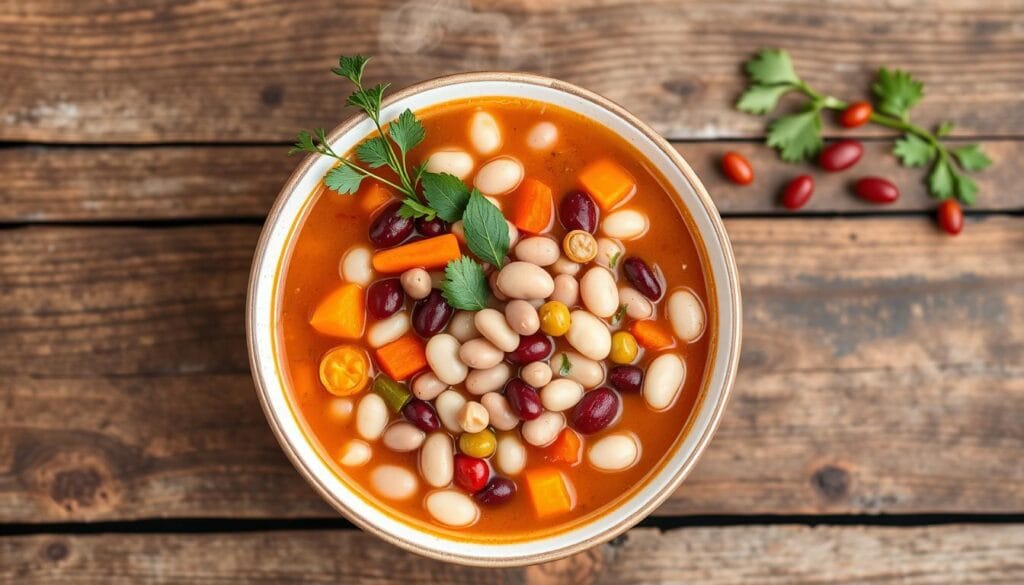Growing up, I always wondered about 15 bean soup. What made it so special? I found out it’s not just a comfort food. It’s a nutritional powerhouse that can change your diet.
When you ask if 15 bean soup is good for you, the answer is yes. Beans are full of important nutrients. The 15 bean soup mixes different beans, making it a meal full of nutrients.
Imagine a bowl of 15 bean soup packed with proteins, fibers, vitamins, and minerals. It has about 32 grams of protein and 9 grams of fiber. This soup is not only tasty but also a complete meal for your body.
Looking for a heart-healthy meal or trying to lose weight? 15 bean soup is perfect. It’s delicious and good for you. Let’s explore more about its amazing health benefits.
Table of contents
Understanding 15 Bean Soup Basics
Exploring 15 bean soup is a tasty and healthy journey. This dish mixes different beans for unique tastes and health perks. A recipe for 15 bean soup offers a mix of textures and nutrients.
What Makes Up a 15 Bean Mix
A 15 bean soup mix is a nutritional powerhouse. It includes:
- Navy beans
- Pinto beans
- Black beans
- Kidney beans
- Lentils
- Chickpeas
- Great Northern beans

Traditional Ingredients and Preparation
To make your 15 bean soup, start by soaking the beans. Most beans need 4-8 hours of soaking. Use low-sodium chicken broth to cover the beans for flavor.
Popular Cooking Methods
There are many ways to cook your bean soup. Slow cookers are easy, cooking in 4 hours on high or 8 hours on low. Stovetop cooking is great for those who like to cook by hand. Pressure cookers cut down cooking time while keeping flavors and nutrients.
Nutritional Profile of 15 Bean Soup
Discovering the nutritional value of 15 bean soup shows it’s a nutrient-rich dish. It’s packed with nutrients that can make your meal healthier. Let’s dive into what makes this soup so nutritious.
Complete Protein Content Analysis
15 bean soup is a protein powerhouse. A single serving has about 29g of protein. This is great for muscle health and overall well-being.
- Protein per serving: 29g
- Protein per 1 cup: 11.8g (with ham and chicken broth)
- Protein per 1 cup (vegetarian): 8.9g
Fiber and Carbohydrate Breakdown
The carbs in 15 bean soup give you energy and help with digestion. With about 73g of carbs per serving, it’s a nutritional powerhouse.
| Carbohydrate Measurement | Amount |
|---|---|
| Carbohydrates per serving | 73g |
| Carbohydrates per 1 cup (with ham) | 27.4g |
| Carbohydrates per 1 cup (vegetarian) | 30.3g |
| Fiber per serving | 3g |
Vitamin and Mineral Content
15 bean soup is more than just protein and carbs. It’s also full of vitamins and minerals that boost your health.
- Vitamin A: 100% of daily requirement
- Potassium per serving: 1600 mg
- Calcium per serving: 58 mg
- Iron per serving: 2 mg

Exploring 15 bean soup recipes shows it’s a nutritious meal. It’s full of flavor and health benefits. Whether you want a protein-rich dish or a nutrient-dense meal, this soup is a great choice.
Is 15 Bean Soup Good for You?

Is 15 bean soup good for you? Absolutely! This dish is packed with nutrients, offering many health benefits. It’s a great choice for your diet.
What makes 15 bean soup so beneficial? It combines different beans for a nutritional boost. Each serving has 12-15 grams of protein, perfect for those looking for a protein-rich meal.
- Supports heart health
- Provides essential nutrients
- Offers complete protein
- Promotes digestive wellness
The benefits of 15 bean soup go beyond just eating. Scientific studies show that eating beans can improve your health in many ways.
| Health Benefit | Nutritional Impact |
|---|---|
| Heart Health | Reduces cholesterol levels |
| Blood Sugar Control | Stabilizes glucose levels |
| Weight Management | Provides long-lasting satiety |
Nutritionists praise 15 bean soup for its high nutrient content. The mix of beans gives you important vitamins and minerals. It’s a great source of protein and fiber, making it a key part of a healthy diet.
Making 15 bean soup is more than just cooking—it’s a health investment. It makes about 6-8 servings and can be frozen for up to 3 months. This soup is both nutritious and convenient.
Health Benefits of Bean Soup Ingredients
Learning about the benefits of bean soup can change how you view healthy eating. Beans are full of nutrients that boost your health. A 2020 study in Nutrients found many Americans don’t eat enough of these protein-rich foods.
So, can you eat bean soup on a diet? Absolutely! Bean soup has many health benefits that help you meet your nutritional goals.
Digestive Health Advantages
Bean soup is great for your digestive health because of its high fiber. Fiber does many good things:
- Promotes regular bowel movements
- Supports healthy gut bacteria
- Reduces the risk of digestive disorders
Heart Health Properties
Your heart will benefit from eating bean soup regularly. It’s full of nutrients that:
- Lower cholesterol levels
- Reduce inflammation
- Improve cardiovascular health
Weight Management Support
Bean soup is great for those trying to lose weight. Eating beans often leads to better body measurements and diet quality. The protein and fiber make you feel full, which can lower calorie intake.
Nutrition experts say soups with about 10 grams of protein per serving are best. Bean soup fits this bill, helping you stay healthy and meet your nutritional needs.
Dietary Considerations and Adaptations
Your 15 bean soup can easily transform to match various dietary needs. The versatility of bean recipes makes 15 bean soup a fantastic option for multiple eating styles.
Different dietary requirements can be seamlessly addressed with smart ingredient modifications. Here are key adaptations for your 15 bean soup ideas:
- Vegetarian/Vegan Options
– Replace meat with vegetable broth
– Add nutritional yeast for flavor
– Include plant-based protein sources like tofu - Gluten-Free Recipes
– Use certified gluten-free broths
– Verify all spice mixes are gluten-free
– Check ingredient labels carefully - Low-Sodium Modifications
– Use fresh herbs instead of salt
– Select low-sodium broth options
– Control sodium by preparing from scratch
Recipes 15 bean soup can be tailored to reduce digestive discomfort. Soaking beans overnight and thoroughly rinsing them before cooking helps minimize potential gas-producing effects.
The 2020-2025 Dietary Guidelines recommend 1½ cups of beans weekly for non-vegetarians and 3 cups for vegetarians. Your 15 bean soup can help meet these nutritional recommendations while providing delicious, adaptable meals.
Making 15 Bean Soup More Nutritious
Turning your 15 bean soup into a health boost is easy. Just a few simple steps can make this comfort food even better.
Healthy Add-ins for Enhanced Nutrition
Make your 15 beans soup even healthier with some tasty, nutritious ingredients. Here are some great options:
- Leafy greens like kale or spinach
- Lean proteins such as chicken or turkey
- Whole grains like quinoa or barley
- Colorful vegetables including carrots and bell peppers
Reducing Sodium Without Sacrificing Flavor
It’s important to keep sodium levels low for a heart-healthy 15 bean soup recipe. Here are some smart ways to do it:
| Sodium Reduction Method | Impact |
|---|---|
| Use low-sodium vegetable broth | Reduces sodium by up to 50% |
| Rinse canned beans | Eliminates excess sodium |
| Add herbs and spices | Enhances flavor without salt |
With these tips, you’ll make a nutritious, tasty 15 beans soup. It will support your health and please your taste buds.
Meal Planning and Portion Control
Wondering if you can eat bean soup on a diet? 15 bean recipes are great for meal planning. Just remember, portion control is crucial for your diet goals.
Planning meals wisely can boost the benefits of bean soup. Use Souper Cubes freezer trays for portioning. They save freezer space and cut down on waste.
- Recommended portion size: 1-1.5 cups per serving
- Freeze individual portions for easy meal prep
- Pair with lean proteins or vegetables for balanced nutrition
Using kitchen tools like pressure cookers can make meal prep faster. A 1,000-watt food processor can chop ingredients quickly. Pressure cookers, costing about $199, are a good investment for meal planning.
Pro tip: Bean soup can be made up to 2 days ahead and stored. It can also be frozen for up to 3 months. This makes meal planning flexible for busy days.
Knowing portion sizes and meal prep methods lets you add 15 bean soups to your diet. It supports your nutrition goals and offers a tasty, fulfilling meal.
Storage and Nutritional Preservation
When you make 15 bean soups, keeping it fresh is key. Knowing how to store it right helps you enjoy it longer. This way, you get to keep all the good stuff in your soup.
Refrigeration Guidelines
Your 15 bean soups can last 3-5 days in the fridge. Just make sure it’s in an airtight container. Cool it down first to stop bacteria from growing.
Freezing Techniques
- Freeze soup in portion-sized containers
- Use freezer-safe bags or containers
- Label with date and contents
- Freeze for up to 6 months
Nutritional Preservation Strategies
| Storage Method | Nutrient Retention | Duration |
|---|---|---|
| Refrigeration | High protein retention | 3-5 days |
| Freezing | Excellent nutrient preservation | 6-12 months |
Always heat your soup to 165°F (74°C) when you reheat it. Proper storage keeps your 15 bean soups fresh and full of nutrients.
Thawing and Reheating Tips
- Thaw frozen soup in the refrigerator overnight
- Avoid repeated freezing and thawing
- Stir well when reheating to distribute heat evenly
- Discard if any signs of spoilage appear
By sticking to these tips, you can enjoy your 15 bean soups for months.
Conclusion
Is 15 bean soups good for you? Absolutely! It’s packed with nutrients that boost your health. With 14 grams of protein and 12 grams of fiber, it’s a nutritional powerhouse.
This soup is not just good for you; it’s also budget-friendly. It’s rich in iron, folate, and potassium, and low in calories. Try a recipe from Twesty Recipes to make it even more delicious and healthy.
Health experts say we should eat more beans. 15 bean soup makes it easy and tasty. It’s low in fat but high in protein and fiber, perfect for balanced nutrition.
Start your nutrition journey with 15 bean soup. Add your favorite spices and veggies to make it even better. Your body will love the nutritious goodness in every spoonful.